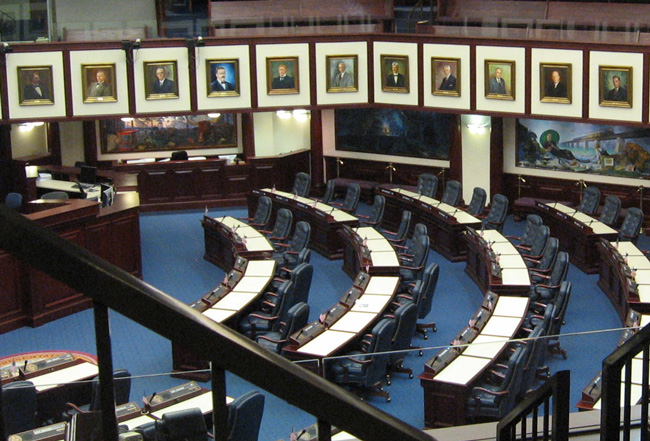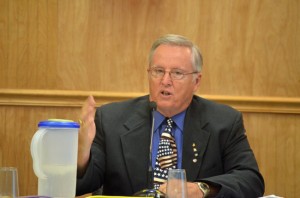
Palm Coast is getting out of the federal lobbying business and sticking with lobbying Tallahassee exclusively. The reason: federal earmarks are no longer the prize money they once were. But Palm Coast will continue its state lobbying efforts: it’s a different animal in a different zoo.
A proposal by one council member to pool the county’s lobbying dollars and encourage cities and the county to work together more—“because we don’t always act like adults when we deal with one another,” council member Bill McGuire said—went nowhere.
Just as Palm Coast has different needs between federal and state lobbyists, it has different needs from those of the county or other cities, other officials countered. The discussion at first focused on Palm Coast’s elimination of a federal lobbying contract.
“Things have changed so much over the past five, six years with regards to how we engage our federal legislators,” Beau Falgout, the city’s senior planner and point man on economic development matters, said Tuesday. “”Earmarks are banned, earmarks are a bad word right now in Congress so you’re not really able to push for those local projects. Really you’re dealing with Congress approving a line-item for budgets and you go and apply to the local agency.”
Palm Coast is also dealing with another reality, diplomatically unspoken at today’s council meeting: previously it could depend on U.S. Rep. John Mica, whose long tenure in Congress (going back to 1993) had given him seniority’s considerable sway. But redistricting shifted Mica’s district, leaving Flagler County with the new District 6, and a freshman congressman in Ron DeSantis. Short-tenured members of Congress have almost no influence in Washington, particularly today’s Washington. Between that, a severely diminished budget for discretionary domestic spending, and the elimination of earmarks, spending more money on federal lobbying appeared to be a losing proposition for the city, especially when lobbying firms would not go along with an hourly rate type of contract. They want an annual retainer.
“Really the cost-benefit right now at this time, the way Congress is working, where all the power is pretty much vested in the executive branch, the funding decisions for local projects, we just don’t think at this time it’s worthwhile to continue,” Falgout said. Congressional staffers will help local governments navigate through grant applications, and that can be done directly in calls between the local government and the congressional offices. But “if it looks like or smells like an earmark, most of them won’t touch it, just because of political reasons.” Jim Landon, the city manager, said that while having a lobbyist at the city’s service was useful, “we weren’t going to pay an annual fee for one or two phone calls a year.”
In its request for proposals, the city received two submissions, a $45,000 proposal from Tallahassee-based Pennington P.A., a large law firm whose clients include mostly state, regional and local government or government-related agencies, as well as several private companies. Palm Coast has been retaining Pennington over the past few years. Palm Coast also received a proposal from Southern Strategy Group, also a Tallahassee-based lobbying firm, for a $60,000 annual fee. Southern Strategy is the firm former Flagler County commissioner Milissa Holland joined as a lobbyist last year. Holland has always maintained close ties with Palm Coast Mayor Jon Netts. But if that association might have suggested an inside track, it didn’t pan out Tuesday.
The council appears ready to go with Landon’s recommendation to stay with Pennington. The end result would not significantly change the amount of money Palm Coast spends on lobbying. In 2013, the city spent $54,000 on federal and state lobbying, with $26,500 of that going to its federal lobbyist. To date this year, the lobbying bill is at $48,000.
A city administration evaluation committee ranked the two firms and gave Pennington a clear advantage, with its recent service for the city weighing in. “They’ve been fairly successful over the past years that they’ve been representing the city,” Falgout said. “Most recently they secured $375,000, that was a line-item appropriation that avoided a veto by Gov. Scott,” which was for a costly and ongoing city utility water-treatment project. The firm also helped the city protect a special designation for the Agricultural Museum that the city itself would not have been able to detect. The firm is also key in swaying legislation and highway funding that favors the city.
None of the council members disputed the city’s approach. But council member Bill McGuire was curious about the possibility of a lobbying coalition that would pool all local governments’ resources to save money and perhaps increase sway.
This year, Flagler County is spending $50,000 only on state lobbying, through Lester Abberger and Florida Lobby Associates. The county is setting aside $55,000 for next year and will, unlike the city, include federal lobbying with Gentry and Associates. Flagler Beach has a $30,000 contract for federal lobbying with Washington, D.C.-based Marlowe and Associates, the same firm that represented Palm Coast. (“They’ve actually decided not to even continue in that business, realizing that there’s just not a future there,” Landon told the council of Marlowe today.)
Flagler Beach intends to continue that contract at that same “not-to-exceed” amount. Bunnell had a $36,000 lobbying contract until July, but it scrapped it as part of its cost-saving measure to close a $1 million deficit.
Is there anything to be said for forming some sort of a lobby coalition so that the municipalities and Flagler County are all singing out of the same hymnal and contributing to the expense?” McGuire asked.
“The problem is that sometimes we’re not singing out of the same hymnal,” Netts said.

Council member Jason DeLorenzo described how the county asked for a letter of support from Palm Coast regarding the county’s attempts to secure federal dollars for beach renourishment. The city was willing to support “the process, not necessarily the plan” DeLorenzo said. “So when the plan comes, maybe we wouldn’t support the plan, but it would be all of our lobbying firms that would be working, so we’d be paying against ourselves. It’s a potential example.”
“That’s unfortunate Jason, I hear what you’re saying, I agree with you,” McGuire said, “but there is so much to be gained by joining forces and it seems to me that since the time I’ve sat on the city council, we don’t always act like adults when we deal with one another.” McGuire said local governments ought to gather together and agree on a set of projects that “we as a group” can get behind.
“You need to understand how lobbyists function. They function because of connections. Where there are issues that the county and the city both agree upon the outcome, having two lobbyists approach the legislature means you have potentially more connections. If we were talking about savings hundreds of thousands of dollars, then I might say, all right, some kind of a joint effort. But I think for those instances where city and county would both agree this is the right way to go, two different lobbyists with two different sets of connections and two different sets of influences probably increases your likelihood of success.”
If it’s a matter of acting like adults, DeLorenzo said, then the two local governments can encourage each other to set their lobbyists on the same agenda. The administration noted that there are numerous issues where such joint approaches are carried out. And Landon, the city manager, concluded the discussion by giving Palm Coast’s own lobbyist a strong endorsement, without joining forces in a coalition. “They stay focused on the needs of your community,” Landon said, while adding to lobbying numbers when the city has a joint project with another local government.
“Hopefully as we’ve demonstrated here we’re talking about $40,000 a year,” Landon said. “We have received a return on that investment well over $40,000 a year throughout the term.” And, he said, given the city’s existing contract with Pennington, and the more expensive proposal from Southern Strategy, “I don’t see any reason to change that relationship and pay more money.”
The council is expected to ratify the new contract at a meeting later this month.





























Leave a Reply